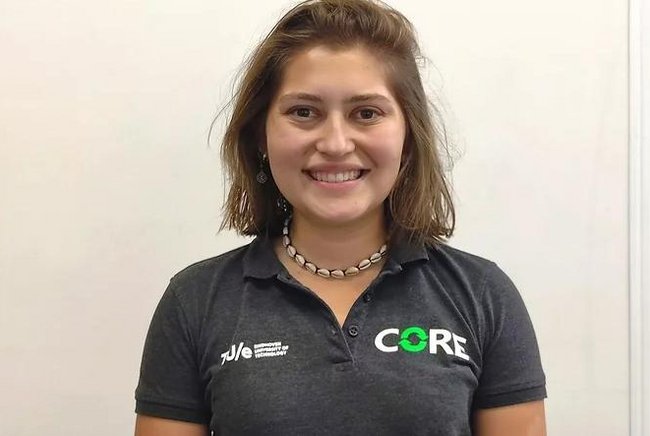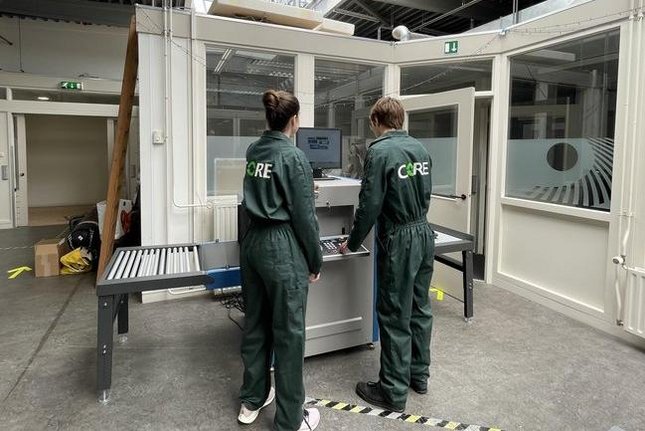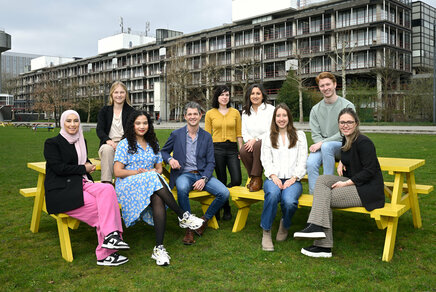‘A student team is like a playground; you can try lots of things in a safe environment’

It is safe to say Tatum Simons does not like sitting still. She is the CORE's team captain, the Go Green Office's events chief, and used to be active in the SensUs student team too. Sustainability is the green thread that runs through everything she does.
-
Who
Tatum Simons (22) has just completed her bachelor's in Sustainable Innovation.
Read more -
Team
Since 2021, she has been captain of team CORE, which tries to find innovative solutions for the recycling sector.
Read more -
And now...
Tatum is preparing to continue her studies. She is enrolled in three different Masters' programs, all with a sustainability focus. But first, this summer, an extended trip to South America.
What is team CORE's goal?
“We want to accelerate innovation in the area of recycling. This Dutch sector is massive, but it has sticking points. Since innovation is expensive, there's little of it. Our student team has a lot of clout, and we try out affordable, feasible e-waste solutions.
The big difference between team CORE and other student teams is that we're much closer to the market. We don't invent the problems; we solve industry issues.”
What did you learn from your time on the team?
“I'm, by nature, a very chaotic person, so learning to plan was a major goal for me. By now, I can easily juggle all the relevant balls plus keep track of five different schedules.
I learned to work with a team too, which goes much further than working on a task together. How do you handle frustrations within a team? What is expectation management?
Also, I wanted to learn how to pitch. That's something I've always been anxious about but that I'm getting better at. And networking; that's essential. My network has grown so much. I can benefit from it now and in the future.
Plus, I learned that if you want something from a company, it's better to visit them in person. In the beginning, I'd spend three hours on the perfect mail to a company that I hoped could spare me five hundred euros. But, when I approach them directly, I can easily get ten times that.”
Did your time with the team influence your future studies or career?
“I now hold a management position at CORE and find I really enjoy it. That's why I think I'll eventually end up in a management position. At the same time, I now know what I don't want: to sit in an office from nine to five! Thanks to my time at team CORE, I've been to so many cool places; those are the kinds of inspiring environments I want to work in.”

What was a personal highlight in your time as part of the team?
“Presenting Temnos, a sorting machine that uses artificial intelligence and vision detection to scan waste stream products. It's a kind of conveyor belt with a camera above and below it. The device can detect the product types and whether they contain a battery, which can catch alight if mishandled. Currently, at recycling companies, people sort the waste, particularly batteries. But people make mistakes; our machine doesn't.
A personal highlight for me is that as manager, I can positively impact the rest of the team. I can motivate and enthuse people. I try to be involved, to be among the people. Sometimes, boring things, like handing out flyers, need to be done. Then, I immediately take the first shift. People follow good examples.”
Were there disappointments too?
“Three girls started at CORE, two international students and me. We loved it, but they came to realize that it wasn't going to work out. They had to work because they didn't get any student grants and had to pass their subjects. So they dropped out after a few weeks, which was a bit disappointing. We had to quickly find new people.”
What advice would you give students who are hesitant about joining a student team?
“Even if you approach a company with good grades, you might not be what they're looking for. You have to stand out, and, as part of a student team, you can do that.
I see a student team as a playground where you can safely discover, try out, and do things. It's terrible when things go wrong, but it doesn't put a company out of business.”
More on our strategy

![[Translate to English:] [Translate to English:]](https://assets.w3.tue.nl/w/fileadmin/_processed_/c/f/csm_BvOF_2024_0319_AEV_license_TUe_Dirk_van_Meer_-_CORE_1__c976e259a5.jpg)

